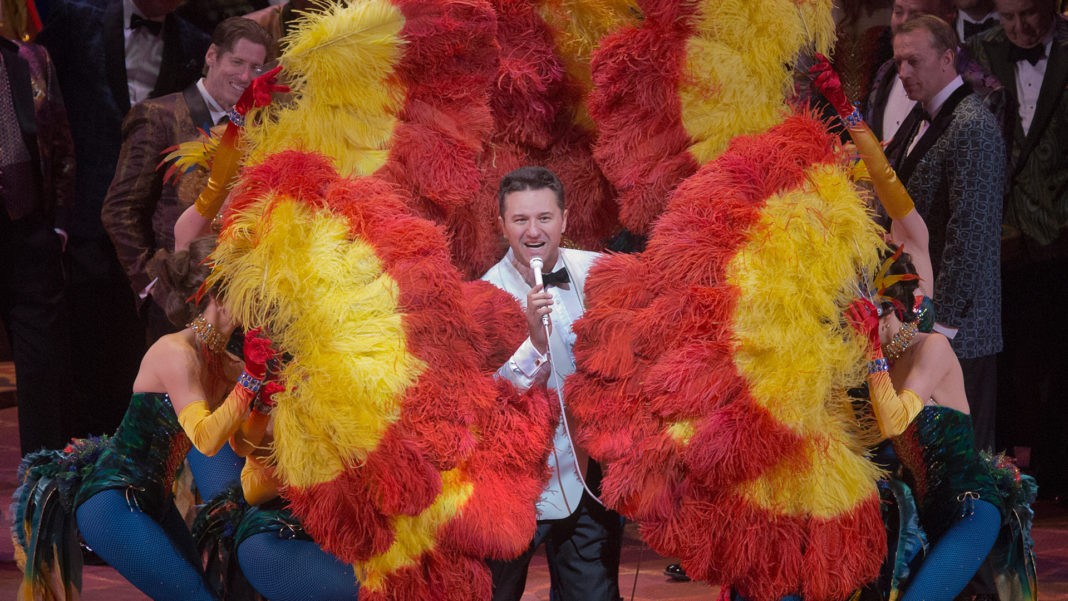Disrupation. Innovation. Revision. Reinvention. Those are just four possible definitions for Week 65 at the Met where the theme is Changing the Scene. All seven productions feature updated settings for classic operas.
I might argue that just a little bit. Thomas Adés’ The Tempest, while many might consider it a modern classic opera, is not traditionally considered a classic opera. Perhaps the definitions have been stretched to include a modern opera based on a classic play that has inspired multiple operatic interpretations.
Since the Met is re-running productions as the bulk of their weekly streaming schedule, I’m going to mix in interviews with the performers and creators in place of clips to avoid the redundancy of showing the same few clips available. Let me know your thoughts!
All productions become available at 7:30 PM EST/4:30 PM PST and remain available for 23 hours. Schedules and timings may be subject to change.
The Met is heavily promoting their Met Stars Live in Concert series and the planned resumption of performances in the 2021-2022 season, so you’ll have to go past those announcements and promos to find the streaming productions on the Metropolitan Opera website.
If you read this column early enough on June 7th, you’ll still have time to see the 2019-2020 season production of Glass’s The Akhnaten that was part of The Operas Behind the Podcast week.
Here is the full line-up for Week 65 at the Met:
Monday, June 7 – Verdi’s Rigoletto – 4th Showing
Conducted by Michele Mariotti; starring Diana Damrau, Oksana Volkova, Piotr Beczała, Željko Lučić and Štefan Kocán. This Michael Mayer production is from the 2012-2013 season.
Victor Hugo, the author of Les Míserables, was also a playwright and it was his play, Le roi s’amuse, that served as the inspiration for Giuseppe Verdi’s opera. Francesco Maria Piave, who regularly collaborated with the composer, wrote the libretto. The opera had its world premiere in Venice, Italy in 1851.
The title character is a jester who serves the Duke of Mantua. The Duke is a seductive man who, upon learning that the woman with whom Rigoletto lives is his daughter and not his wife, makes the young woman, Gilda, his next target. Curses, assassination plots and more leave this clown without much to smile about.
Michael Mayer won a Tony Award for his direction of the original production of Spring Awakening. He came up with the idea of a “Rat Pack Rigoletto” and moved the action to Las Vegas in the early 1960s.
While reviews were mixed for the production, Mayer was prepared for whatever reaction was going to come his way for his production as he told the New York Times prior to the first performance. “I’ve been warned, but some people have said if you get booed at the Met or at La Scala, you know you’re doing something right. In any case, to employ a pun: hopefully the booze I will have ingested prior to that moment will make the boos I hear a little dimmer.”
Tuesday, June 8 – Gounod’s Faust – 5th Showing
Conducted by Yannick Nézet-Séguin; starring Marina Poplavskaya, Jonas Kaufmann, Russell Braun and René Pape. This Des McAnuff production is from the 2011-2012 season.
Charles Gounod’s Faust had its world premiere in Paris in 1859. The libretto was written by Jules Barbier and Michel Carré who used both Carré’s play Faust et Marguerite and Johann Wolfgang von Goethe’s Faust, Part One as inspiration.
This oft-told story is about a man who sacrifices his soul to the devil, Méphistophélès, in order to maintain his youth and the love of Marguerite.
But you know what happens when you make a deal with the devil…it’s not going to end well.
McAnuff made his Metropolitan Opera debut with this production. He is best known as the director of Jersey Boys and Ain’t Too Proud on Broadway. In his Faust he chose to set this production before and after the dropping of atom bombs in Japan in World War II.
Critics may have been divided over Des McAnuff’s approach, but they were unanimous in their praise of tenor Jonas Kaufmann. Audiences were too. His performance generated a lot of emotion from audiences attending this production.
Wednesday, June 9 – Bellini’s La Sonnambula – 3rd Showing
Conducted by Evelino Pidò; starring Natalie Dessay, Juan Diego Flórez and Michele Pertusi. This Mary Zimmerman production is from the 2008-2009 season.
Bellini’s opera had its world premiere in 1831 in Milan. The libretto was written by Felice Romani who also collaborated with the composer on Norma.
The original story was set in a 19th century Swiss village where the orphan Amina is engaged to be married to Elvino. Their plans are complicated by the arrival of Rodolfo who believes Amina to be a long-lost love from younger days. The village, however, is haunted by the appearance of a ghost. This turns out to be Amina walking in her sleep. Elvino becomes suspicious about his fiancé’s activities and begins to fall in love with another woman in the village. Can love conquer all including sleepwalking?
This was the first production of La Sonnambula at the Met since 1972. Zimmerman set the story in a New York rehearsal room where the performers are rehearsing a production of the opera set in a Swiss village.
Anthony Tommasini of the New York Times wasn’t a fan of this concept, but he did enjoy the singing.
“It must be said that Ms. Zimmerman has elicited wonderfully sung and mostly affecting performances from her leads, the riveting French coloratura soprano Natalie Dessay as Amina, and the charismatic Peruvian tenor Juan Diego Flórez as Elvino.”
Thursday, June 10 – Handel’s Agrippina – 5th Showing
Conducted by Harry Bicket; starring Brenda Rae, Joyce DiDonato, Kate Lindsey, Iestyn Davies, Duncan Rock and Matthew Rose. This David McVicar production is from the 2019-2020 season.
George Frideric Handel’s Agrippina has a libretto by Cardinal Vincenzo Grimani. The opera had its world premiere in 1709 in Venice at the Teatro S Giovanni Grisostomo which was owned by Grimani.
Agrippina is the Roman empress who is fixated on the idea of having her highly unqualified son, Nerone, take over the throne. To do that, she will stop at nothing to get her husband, Claudio, to cede it to him.
Though McVicar’s production was first staged in Brussels in 2000, this marked the first ever Metropolitan Opera production of Agrippina. Conductor Harry Bicket lead from the harpsichord and audiences and critics were enthralled.
Zachary Woolfe, in his review for the New York Times said, “Three centuries on, Agrippina remains bracing in its bitterness, with few glimmers of hope or virtue in the cynical darkness. But it’s irresistible in its intelligence — and in the shamelessness it depicts with such clear yet understanding eyes.”
Friday, June 11 – Thomas Adès’s The Tempest – 4th Showing
Conducted by Thomas Adès; starring Audrey Luna, Isabel Leonard, Alek Shrader, Alan Oke and Simon Keenlyside. This Robert Lepage production is from the 2012-2013 season.
The Tempest by Thomas Adés had its world premiere in London in 2004. The libretto, by Meredith Oakes, is inspired by William Shakespeare’s play, but is not slave to it. There are differences.
The Duke of Milan, Prospero, has been exiled and with his daughter, Miranda, they have been set to sea. They ultimately land on an island filled with spirits. Amongst those spirits are Ariel and the monster, Caliban. Prospero, who has magical powers, causes a ship carrying the King of Naples and his son Ferdinand to wreck during a storm Prospero created. Relations both personal and professional collide leaving each of the participants changed and one of the characters alone in the island.
Between its London premiere and its debut at the Met in 2012, there had already been four other productions of The Tempest. Few contemporary operas get that many productions in so short a period of time.
Alex Ross, writing for The New Yorker, said of Adés’ opera (one of at least fifty operas based on Shakespeare’s play), “The Tempest is the opposite of a disappointment; it is a masterpiece of airy beauty and eerie power. As if on schedule, Adès, at thirty-two, is now the major artist that his earliest works promised he would become.”
Saturday, June 12 – Verdi’s Falstaff – 5th Showing
Conducted by James Levine; starring Lisette Oropesa, Angela Meade, Stephanie Blythe, Jennifer Johnson Cano, Paolo Fanale, Ambrogio Maestri and Franco Vassallo. This Robert Carsen production is from the 2013-2014 season.
Two of Shakespeare’s play served as the inspiration for Verdi’s Falstaff: The Merry Wives of Windsor and sections from Henry IV Parts 1 and 2. Arrigo Boito adapted the plays to create the libretto. Falstaff had its world premiere in 1893 at La Scala in Milan. This was Verdi’s final opera and only his second comedic opera.
Simply put, Sir John Falstaff tries everything he can to woo two married woman so he can assume their husband’s vast fortunes. He’s rather bumbling in his efforts and the machinations in place to thwart his endeavors leave him with nothing short of a major comeuppance.
In Carsen’s production the story has been updated to England in the 1950s. His approach to Verdi’s opera was much lighter than is commonly done and, as a result, yielded overwhelmingly great reviews.
On opening night Maestri performed the role of Falstaff for his 200th time. Anthony Tommasini, in his review for the New York Times, raved about him:
“A splendid cast is led by the powerhouse Italian baritone Ambrogio Maestri, who simply owns the role of Falstaff…At 6 foot 5 with his Falstaffian physique, Mr. Maestri certainly looks the part. A natural onstage, and surprisingly light on his feet, he makes Falstaff a charming rapscallion and sings with consummate Italianate style.”
Sunday, June 13 – Mozart’s Così fan tutte
Conducted by David Robertson; starring Amanda Majeski, Serena Malfi, Kelli O’Hara, Ben Bliss, Adam Plachetka and Christopher Maltman. This Phelim McDermott is from the 2017-2018 season.
Mozart’s Cosí fan tutte had its world premiere in Vienna in 1790. Lorenzo Da Ponte, who wrote the libertti for The Marriage of Figaro and Don Giovanni, wrote the libretto.
Ferrando and Guglielmo are vacationing with their fiancées, Dorabella and Fiordiligi. They are sisters. Don Alfonso challenges the men to a bet revolving around the women and their ability to be faithful. Using disguise, deception and a wicked sense of humor, Mozart’s opera ends happily ever after for one and all.
This production transports the original Naples setting in the 18th century to Brooklyn in the 20th century. Specifically, McDermott places the opera at an amusement park filled with the attractions you’d expect to set at the side show: sword swallowers, a bearded lady, a fire eater, a strongman and a contortionist.
Anthony Tommasini seemed a bit torn about the effectiveness of this setting. In his New York Times review he said:
“I have never seen a production that completely cracks the code of Così, and for all its charms and insights, this production also comes up short. Mr. McDermott’s concept doesn’t explore the unsettling elements as much as some productions I’ve seen. But one thing it gets right is the role of sexual desire as a motivator for these lovers. To that end, moving the story to the 1950s, when proper young people refrained from premarital sex, and setting it in an amusement park, where the couples are on vacation, work well.”
That’s the full line-up for Week 65 at the Met. We don’t have any idea what the schedule has for Week 66. Since Nelson Riddle never did an opera that we’re aware of, I guess we won’t be hearing the theme for Route 66 during Week 66.
Enjoy your week! Enjoy the operas!
Photo: Piotr Beczała in Rigoletto (Photo by Ken Howard/Courtesy Metropolitan Opera)














